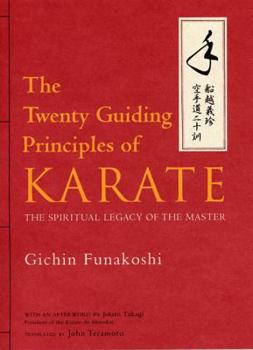The Twenty Guiding Principles of Karate: The Spiritual Legacy of the Master
Select Format
Select Condition 
Book Overview
Gichin Funakoshi , "the father of karate," once said that "that ultimate aim of karate lies not in victory nor defeat, but in the perfection of the character of its participants." To support this life-long stance and offer guidance to future practitioners, he penned his now legendary twenty principles. While the principles have circulated for years, a translation of the accompanying commentary has never found its way into publication-until now. Master...
Format:Hardcover
Language:English
ISBN:4770027966
ISBN13:9784770027962
Release Date:November 2003
Publisher:Kodansha
Length:127 Pages
Weight:0.59 lbs.
Dimensions:0.6" x 7.5" x 5.5"
Customer Reviews
4 ratings
For True Martial Artists & Real Warriors
Published by Thriftbooks.com User , 16 years ago
This is a great book on the real philosophy behind the martial arts. Although Master Funakoshi founded Shotokan karate, the principles in this book are universal throughout the world of martial arts. This should be required reading for every martial artist, and especially those who practice Shotokan karate. I have a lot of respect for Master Funakoshi from studying his life and therefore his writings carry a lot of weight with me. This book, although a short and easy read, is packed full of wisdom and should be a part of every martial artist's home library. Bohdi Sanders, author of Warrior Wisdom: Ageless Wisdom for the Modern Warrior
THE Basis of Karate-Do
Published by Thriftbooks.com User , 17 years ago
Master Funakoshi provides an even greater legacy to our troubled world than that of modern karate. His book, "The Twenty Guiding Principles of Karate," is a rich guide to living one's life day-to-day. The applicability is not just to the dojo; but our homes, the corporate world, and every other environment. Although the serious karateka will treasure this volume; anyone who understands the benefits of mind-body-spirit integration can gain from the lessons. Some may say the book is too short; it is deceptively short and deceivingly simple. It is easy for a reader to "intellectually" connect with a long tome where everything is spelled out. They close the volume and that's that. The challenge is every morning and evening to look oneself directly in the eye and do an honest inventory of how we are living the principles. As Rule #4 clearly states (echoing one of the most insightful strategies of Sun Tsu); First Know Yourself Then Know Others. In the same way that one can never "master" karate, the wisdom that can be gained from the insights Master Funakoshi offers is directly proportional to the honest introspection of the reader. When many people are so quick to judge and blame others for the quality of their lives, rather than assume responsibility, this book offers simple guidance. Each time I read it, there is some new insight gleaned; another layer peeled. At times, there is a brief moment of chagrin accompanying the realization of a behavior not in keeping with the principles; but quickly followed by appreciation for the opportunity to change. As with Principle #1; a little more REI (respect) could go a long way in all venues.
Short but sweet
Published by Thriftbooks.com User , 20 years ago
This elegant book is a great treatise on the spiritual and mental aspects of traditional karate. Funakoshi, founder of the Shotokan School outlines the principles he felt exemplified the true spirit of karate. This is not "how to" book nor is it about technique. It is, however, an insightful easy read. I recommend it for those students who are interested in the deeper meaning of martial arts beyond just the techniques. I only wish it was longer. Lawrence Kane Author of Surviving Armed Assaults, The Way of Kata, and Martial Arts Instruction
Life Lessons in a Martial Context
Published by Thriftbooks.com User , 20 years ago
In this book, Sensei Funakoshi outlines the philosophical benchmarks that exemplify the way a true Do practitioner should live and think. He has provided here an invaluable resource, not only for lessons inside of the dojo- but for outside as well. I must emphasize that books like these, in general, are not only for the instructor Sensei, but should ESPECIALLY be looked at by sometimes confused students (kyu) who need guidance at times with understanding how their dojo training can continue outside of class as well. These lessons are simple in nature, but upon closer review, along with commentaries to go with them, one may find deeper meanings in Funakoshi's few words- making the lessons so easy, yet just that hard as well. Each principle is complimented, again, by insightful commentary, and shown with beautiful calligraphy which in and of itself bring an elegance, style, and simplicity to this beautiful book.





